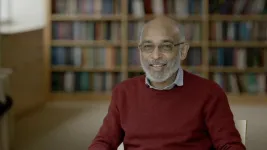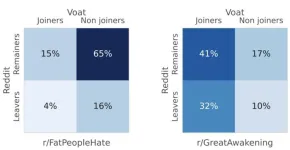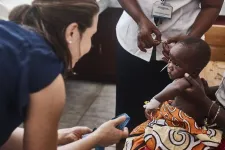(Press-News.org) Today, the Alzheimer’s Association, Global Brain Health Institute (GBHI), and the UK-based Alzheimer’s Society announced the most recent awardees of the Pilot Awards for Global Brain Health Leaders, a competitive funding initiative dedicated to nurturing efforts and improving outcomes in the fields of brain health and dementia.
“The Alzheimer’s Association is proud to partner with GBHI and the Alzheimer’s Society to make these innovative grants,” said Heather M. Snyder, Ph.D., Alzheimer’s Association vice president of medical and scientific relations. “These awards focus on understanding risk for, and resilience to, Alzheimer's and other dementia. The goal is to support the awardees’ efforts to spread awareness, delay, prevent and reduce the impact of dementia.”
“The emphasis is on lower- and middle-income communities, where growth of the prevalence of Alzheimer’s and other dementia is forecast to be highest, and on projects that utilize an evidence-based approach to improve care and outcomes around age-related cognitive loss and dementia,” Snyder added.
Nurturing Brain Health for the Vulnerable
A total of 26 awards have been granted to projects aimed at bridging the gaps in dementia diagnosis, treatment, and care among underserved populations worldwide. The projects span 16 countries, including Australia, Brazil, Chile, Colombia, Democratic Republic of the Congo, Ethiopia, India, Ireland, Israel, Mexico, Nepal, Nigeria, Peru, South Korea, the United Kingdom, and the United States.
Though there is currently no cure for dementia, we do know that up to 40% of cases are due to modifiable risk factors that may be addressable through public health and lifestyle interventions according to the Lancet Commission on Dementia. Of the 50 million people affected by dementia worldwide, the highest toll is experienced by at-risk and disadvantaged populations.
“The pilot projects tackle equity in brain health by testing or implementing interventions or other strategies that are tailored to the needs of the region where the awardees work and their unique interests and strengths,” said Kate Possin, PhD, GBHI faculty member and Professor of Neurology at University of California, San Francisco.
Addressing Stigma, Training and Social Determinants of Health
This year, several projects focus on the power of storytelling to reduce stigma and empower persons living with dementia. For instance, one project aims to create a non-fiction podcast about the 500-year-long cases of Early Onset Alzheimer's Disease in Medellin, Colombia, focusing on a family with a unique genetic mutation linked to the disease and its potential for preventing neurodegeneration. Another project in Brazil plans to produce a documentary shedding light on the challenges of social isolation, loneliness, and more faced by people living with dementia, while a UK-based effort seeks to create dramatic monologues to be performed on stage and captured on film inspired by various dementia subtypes.
Despite most dementia cases occurring in low- and middle-income nations, initiatives for dementia risk reduction remain limited in these regions. Several projects confront the hurdles associated with training, including one in Nigeria focused on educating health educators in dementia risk reduction and another in Ethiopia developing a culturally sensitive, competency-based dementia training program for primary healthcare workers.
Recognizing the profound impact of Social Determinants of Health (SDOH) on cognitive well-being and dementia risk among older adults, several projects delve into these factors. Among them, a project in Mexico explores the relationship between diet and brain health, a South Korean endeavor investigates the influence of SDOH on brain health, and a project in the Democratic Republic of Congo examines the connection between multidimensional poverty and cognitive function.
“One in three people born today will develop dementia in their lifetime. Research will beat dementia; it’s critical we invest now in innovative research to tackle the most critical challenges of the future,” said Richard Oakley, PhD, associate director of research and innovation at Alzheimer’s Society. “By supporting initiatives like this, Alzheimer's Society can continue to provide hope for the future while transforming lives today – helping ensure people can access a dementia diagnosis, treatments and support, so they can remain independent and live fulfilled lives for as long as possible.”
Early Indicators of Success
The total funding of approximately $650,000 (£530,000, €614,000) includes about $25,000 (£20,000, €24,000) for each individual award to enable the recipients—who are all Atlantic Fellows for Equity in Brain Health—to test an approach and then, if successful, seek further resources to scale up their work.
The 26 awardees will join 137 previously funded pilots in 42 countries, bringing the total awarded to date to $4.1 million in 45 countries. Since the program launched, awardees have leveraged their projects for an additional $16.1 million investment directly related to their pilot projects. The visionary work of the awardees has led to a total of more than $93.5 million to further advancements of dementia-related resources.
# # #
Alzheimer's Association
The Alzheimer’s Association is a worldwide voluntary health organization dedicated to Alzheimer’s care, support and research. Our mission is to lead the way to end Alzheimer's and all other dementia — by accelerating global research, driving risk reduction and early detection, and maximizing quality care and support. Our vision is a world without Alzheimer's and all other dementia®. Visit alz.org or call 800.272.3900.
Global Brain Health Institute
The Global Brain Health Institute (GBHI) is a leader in the global community dedicated to protecting the world's aging populations from threats to brain health.
GBHI works to reduce the scale and impact of dementia in three ways: by training and connecting the next generation of leaders in brain health through the Atlantic Fellows for Equity in Brain Health program; by collaborating in expanding preventions and interventions; and by sharing knowledge and engaging in advocacy.
We strive to improve brain health for populations across the world, reaching into local communities and across our global network. GBHI brings together a powerful mix of disciplines, professions, backgrounds, skills, perspectives, and approaches to develop new science-based solutions. We focus on working compassionately with all people including those in vulnerable and under-served populations to improve outcomes and promote dignity for all people.
GBHI is based at the University of California, San Francisco, and Trinity College Dublin. Visit www.gbhi.org.
Alzheimer's Society
Alzheimer's Society is the UK's leading dementia charity. We provide information and support, fund research, campaign to improve care and create lasting change for people affected by dementia in England, Wales and Northern Ireland.
The mission of Alzheimer's Society is to transform the landscape of dementia forever. Until the day we find a cure, we will strive to create a society where those affected by dementia are supported and accepted, able to live in their community without fear or prejudice.
Alzheimer's Society relies on voluntary donations to continue our vital work. You can donate now by calling 0330 333 0804 or visiting alzheimers.org.uk. Alzheimer's Society provides the Dementia Connect support line, the number is 0333 150 3456.
END
Pilot awards to advance global brain health and dementia projects
2023-10-31
ELSE PRESS RELEASES FROM THIS DATE:
Anesthesia technology precisely controls unconsciousness in animal tests
2023-10-31
If anesthesiologists had a rigorous means to manage dosing, they could deliver less medicine, maintaining exactly the right depth of unconsciousness while reducing postoperative cognitive side effects in vulnerable groups like the elderly. But with myriad responsibilities for keeping anesthetized patients alive and stable, as well as maintaining their profoundly unconscious state, anesthesiologists don’t have the time without the technology.
To solve the problem, researchers at The Picower Institute for Learning and Memory ...
The limits of deplatforming
2023-10-31
Social media can incubate communities that are so resilient that even banning them from the platform cannot destroy them. Michele Starnini and colleagues studied two online communities on the social media site Reddit: the far-right conspiracy theory subreddit GreatAwakening, which was banned in 2018, and the hate-speech subreddit FatPeopleHate, banned in 2015. Both communities decided amongst themselves to move to Voat, an unmoderated Reddit clone designed to serve those banned by Reddit. The authors estimate that less than 20% of FatPeopleHate users migrated to Voat, while more than 70% of GreatAwakening users migrated to the new platform. This result suggests that members ...
CCDC expands global talent pool with Ghana-based Orgmento
2023-10-31
· CCDC extends its partnership with Orgmento, a Ghanaian software engineering and data sciences company.
· The partnership, which started in 2021, has been strengthened by the shared commitment to engineering excellence from both organizations, and has now been extended for a further 3 years.
· Software engineering teams from the CCDC and Orgmento will build software to advance structural science.
Cambridge, UK. 31 October 2023
The Cambridge Crystallographic ...
DNA organization influences the growth of deadly brain tumors in response to neuronal signals
2023-10-31
A pioneering study at Umeå University, Sweden, has unveiled that the 3D organization of DNA can influence the progression of the aggressive brain tumour known as glioblastoma. Having identified the factors that glioblastoma uses to respond to neurons by growing and spreading, this discovery paves the way for further research into new treatments for brain tumours.
"We have now identified the most important factors behind how the tumour responds to nerve cells, thus becoming more dangerous. These findings offer hope in our long-term battle against this difficult-to-treat ...
Humans are disrupting natural ‘salt cycle’ on a global scale, new study shows
2023-10-31
The planet’s demand for salt comes at a cost to the environment and human health, according to a new scientific review led by University of Maryland Geology Professor Sujay Kaushal. Published in the journal Nature Reviews Earth & Environment, the paper revealed that human activities are making Earth’s air, soil and freshwater saltier, which could pose an “existential threat” if current trends continue.
Geologic and hydrologic processes bring salts to Earth’s surface over time, but human activities such as mining and land development are rapidly accelerating the natural “salt ...
Want to prevent misinformation? Present data with an interactive visual.
2023-10-31
Getting readers of a news story interested in numbers can be a challenge. But the benefits of engaging readers in data can lead to a better understanding, preventing misinformation and misrepresentation in the news.
New research by Haiyan Jia, assistant professor in the Department of Journalism and Communication and the Data X Initiative at Lehigh University, and S. Shyam Sundar, the James P. Jimirro Professor of Media Effects at Penn State University, explored different ways journalists present data and recommend a method using an interactive visualization.
Inspired by exemplification theory, Jia wanted to see the persuasive effect data could have and whether ...
Surrey researchers use AI to make mobile networks more efficient
2023-10-31
A new artificial intelligence (AI) model, developed by the University of Surrey, could help the UK's telecommunications network save up to 76% in network resources compared to the market's most robust Open Radio Access Network (O-RAN) system – and improve the environmental sustainability of mobile networks by using less energy.
In a study published in the journal IEEE Transactions on Network Service Management, Surrey researchers detail how it is possible to save bandwidth by mathematically modelling the network and using AI to find the best ...
Giant planets cast a deadly pall
2023-10-31
Giant gas planets can be agents of chaos, ensuring nothing lives on their Earth-like neighbors around other stars. New studies show, in some planetary systems, the giants tend to kick smaller planets out of orbit and wreak havoc on their climates.
Jupiter, by far the biggest planet in our solar system, plays an important protective role. Its enormous gravitational field deflects comets and asteroids that might otherwise hit Earth, helping create a stable environment for life. However, giant planets elsewhere in the universe do not necessarily protect life on their smaller, rocky planet neighbors.
A new Astronomical Journal paper details how the pull of massive ...
GED recipients have worse health outcomes than high school graduates
2023-10-31
Toronto, ON — New research published earlier this month in the International Journal of Aging and Human Development has highlighted the significant health disparities among older adults with a General Education Development (GED) certificate compared to their peers with a high school diploma.
Researchers from the University of Toronto examined health outcomes among approximately 400,000 older adults from the American Community Survey, a representative sample of community-dwelling and institutionalized older Americans. They found that ...
Antibiotics for common childhood infections no longer effective
2023-10-31
Drugs to treat common infections in children and babies are no longer effective in large parts of the world, due to high rates of antibiotic resistance.
The University of Sydney led study found many antibiotics recommended by the World Health Organization (WHO) had less than 50 percent effectiveness in treating childhood infections such as pneumonia, sepsis (bloodstream infections) and meningitis. The findings show global guidelines on antibiotic use are outdated and need updates.
The most seriously ...





